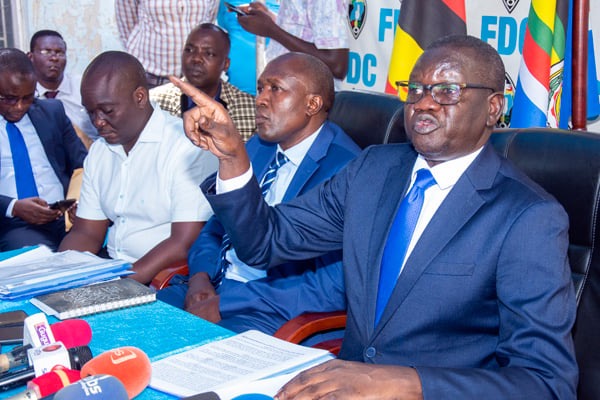
In a bid to mend internal divisions within the Forum for Democratic Change (FDC), President Patrick Amuriat has announced significant strides towards reconciliation with disgruntled party leaders, many of whom have found refuge in Katonga.
Amuriat revealed that persistent efforts have resulted in a considerable number of members rejoining the party, with ongoing discussions to bring back others who remain in dissent. "We've been actively working towards reconciliation, and we're pleased to see tangible results as many former members have returned to the fold," stated Amuriat. However, the identities of returning members were not disclosed, though reports suggest that notable figures, including MPs William Nzoghu, Florence Kabugho, and Harold Muhindo from Kasese, may be among them.
While Amuriat remains optimistic, former FDCmember and Leader of the Opposition, Prof Ogenga Latigo, expressed skepticism about the reconciliation efforts. Latigo asserted that returning to Najjanankumbi holds no merit, praising those who have chosen to walk away, particularly highlighting former party spokesperson Ibrahim Ssemujju Nganda's decision.
The rift within the FDC party escalated last year, resulting in the expulsion of some leaders, including former national chairman Wasswa Birigwa, over allegations of financial impropriety. Amuriat and Secretary General Nathan Nandala Mafabi deny these accusations vehemently.
Birigwa and other leaders found themselves in a dramatic standoff at the party headquarters, which culminated in a humiliating exit for Birigwa. Blaming Amuriat and Mafabi for the debacle, Birigwa has vowed not to return to Najjanankumbi until the two leaders step down.
Despite dissenting voices, Amuriat affirmed the party's commitment to reconciliation, announcing plans to convene with all FDC Members of Parliament to further advance the reconciliation agenda.
The splinter group, which found refuge under the wings of former FDC president Kizza Besigye at Katonga Road, emerged following allegations of financial impropriety during a meeting at Nsambya Sharing Hall, leading to a factional split within the party.
As the FDC navigates through these turbulent waters, Amuriat's reconciliation efforts stand as a testament to the party's resilience and determination to overcome internal challenges for the greater good of the opposition movement.
The future of the FDC hangs precariously in the balance. The Katonga faction's National Council could be a turning point, either paving the way for dialogue and reconciliation or solidifying the split. The court's verdict, whenever it arrives, will also play a crucial role in shaping the party's trajectory. Ultimately, the question remains: will the FDC rise above its internal strife and emerge as a united force, or will its fragmentation leave it powerless on the sidelines of Ugandan politics?

















